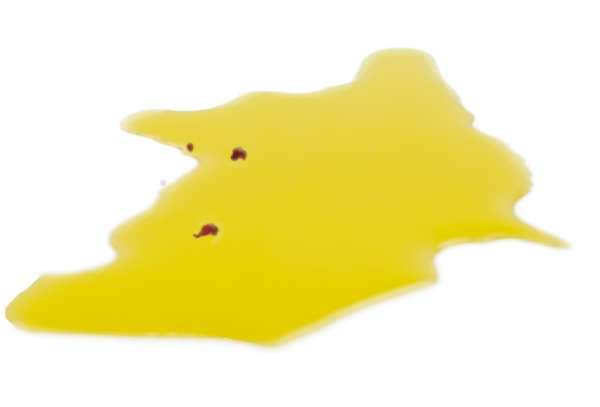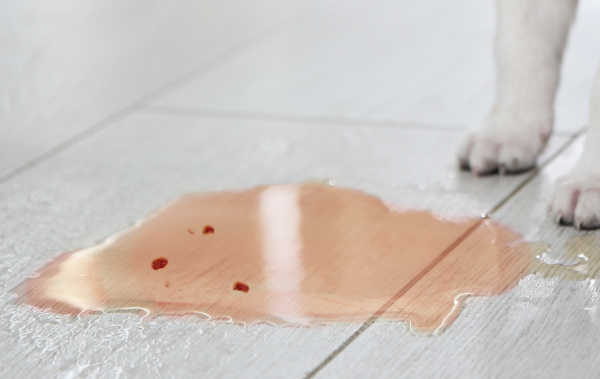
This article was updated on July 10th, 2023
As a dog parent, you keep a close eye on what your dog eliminates. Even though it may sound gross, knowing what your dog’s pee and poop looks like will go a long way in telling you how they are feeling. Few abnormalities of those eliminations are scarier than seeing blood in your dog’s urine, or blood clots in your dog’s urine. We’re here to tell you some possible causes for seeing blood clots in your dog’s urine as well as what to do about it.
What Do Blood Clots in a Dog’s Urine Look Like?
It may seem pretty straightforward, but let’s first go over what you may see when there are blood clots in your dog’s urine. There are a few different ways that blood clots can show up.
Situation 1: normal yellow urine with red spots.
One way is to have normal-colored, yellow urine with bright red globs in it, as pictured below.

You may not see the blood with your naked eye in your dog’s urine (besides the blood clots), and your dog’s pee will appear as normal. However, the urine probably still contains red blood cells. Your pup may also be exhibiting other signs including frequent urination or straining to urinate.
Situation 2: red-colored urine with blood clots.
Another way is when you can actually see the blood in the urine, in addition to the blood clots. This shows up as red or brownish colored urine and could appear with or without blood clots.

Having any type of blood in your dog’s urine usually indicates that something is off in the urinary tract, which includes the kidneys, bladder, ureters, urethra, and in intact males, the prostate. Having normal-colored urine with blood clots in it may also point to something outside of the urinary tract that is causing blood to clot and that could also be very serious.
Related Post: Blood in Dog’s Urine: Our Vets Explain What to Do
What Causes Blood Clots in Your Dog’s Urine?
Before we get into specifics, it’s important to know what a blood clot is. A blood clot forms when platelets and plasma proteins present in the blood thicken and clump together. The idea is to form a blockage to prevent more blood from escaping a damaged vessel. Most of the time blood’s ability to clot is lifesaving, however there are times when blood clots can be abnormal and even bad for a dog’s body.
Seeing blood clots in your dog’s urine should alert to you that there is an inflammation in the urinary tract that is causing bleeding and clots to come out in the urine. It can also be an indication that something more serious is going on elsewhere in the body. Many different things can cause blood clots in urine, some more serious than others.
“Having any type of blood in your dog’s urine usually indicates that something is off in the urinary tract”
Causes of abnormal blood clotting include:
- Parasites, including heartworms and tick-borne diseases
- Kidney disease, diabetes, Cushing’s disease, hypothyroidism
- Damage to blood vessels
- Injuries that cause inflammation
- Medications, mainly long-term steroid use
- Aneurysm or stroke
- Hypercoagulability
Now on to the different causes related to the urinary tract.
- Urinary tract infections (UTI in Male Dogs / UTI in Female Dogs)
- Kidney infections
- Kidney or bladder stones
- Prostate cancer or inflammation
- Bladder cancer
Call Your Vet Now, Especially If Your Dog is Showing Other Signs of Illness
Seeing blood clots in your dog’s urine doesn’t mean that you should wait and see what’s going to happen next, instead, call your vet as soon as possible, especially if they are showing any other signs. The reason blood clots can be so dangerous is if they are caused by something somewhere in the body other than the urinary tract. This could mean that other clots are traveling to the heart, lungs, or brain where they can do serious damage.
Veterinarian Diagnosis
Once you get your dog to the clinic, your vet is going to want to know when you started seeing blood clots in the urine and if your dog is showing any other signs. They will then try to get a urine sample, if you didn’t provide one, and run a urinalysis. This will help rule out a UTI, urinary crystals, and others.
An x-ray or ultrasound may need to be done to visualize the bladder and check for stones or tumors. Bloodwork to check for kidney function and other organs may be done as well. Additional tests may be necessary if parasites, tick-borne diseases, or clotting abnormalities are suspected.
Treatments
From there, your vet will choose the best treatment depending on the diagnosis. UTI’s and kidney infections are commonly taken care of with antibiotics. Urinary stones may respond to a diet change or to surgical removal. Bladder cancer may need surgery and chemotherapy or radiation.
Other, non-urinary tract causes, will be treated based on the underlying condition. Blood thinners may also be prescribed to prevent future blood clots from happening.
What You Can Do at Home to Help Your Dog With Blood Clots in Urine
Seeing any blood or blood clots in your dog’s urine should be a literal red flag that something is very wrong. See your veterinarian as soon as possible to diagnose the problem and get treatment started. However, you may be able to help your vet and dog with the following:
- Carefully observe your dog when they pee. If you can note when the clot appears, whether at the beginning, middle, or end of urination, it may be helpful diagnostically.
- Catch a urine sample in a clean container. Your vet will appreciate it as well. If you aren’t able to catch a urine sample at home, make sure your dog doesn’t pee before going to the clinic so that your vet will be able to get a sample on their own.
Watch this quick video to find out how to collect a urine sample from a dog:
- Make a note of any other signs that your dog may be showing to share with your vet and tell them how long they’ve been doing those things.
- Keep your pup comfortable and quiet.
Symptoms to Keep an Eye On
Along with off-colored urine or normal urine with red blood clots in it, your dog may also be showing some other signs. That would most commonly be:
- Pain when urinating: Passing a blood clot can hurt, so you may notice your dog hunching over, whining or crying when peeing, or frequently trying to pee but nothing comes out.
- Pee accidents in the house: Dogs with blood clots in the urine may also have some pee accidents in the house, which is often how you notice the blood clots in the first place. They may appear a little agitated and even become a little aggressive, especially if you touch or push their abdomen or around their genitals.
- Excessive licking: You may also notice them excessively licking their genitals, panting, nervously pacing, or they may become lethargic. Dogs may also vomit, be nauseous, or not want to eat.
All of these signs should alert to you that something is wrong with your pup and that they need to see a vet.
How Can I Check My Dog’s Urine for Blood Clots?
It can be really hard to tell if your dog’s urine is discolored or has blood clots. With that in mind, try to catch some urine in a clean, clear or white container. If your dog is too shy for this, you may have your dog wait a little longer once they ask to go outside. The idea is to have them need to go so badly that they don’t care if you’re near them with a container.
If that still doesn’t work, take a paper towel or napkin with you on potty breaks and try to soak some urine up from the grass, rocks, or sidewalk.
Can Blood Clots in Dog’s Urine be Prevented?
The best way to prevent blood clots from coming back in your dog’s urine is to treat any underlying issues per your veterinarian’s instructions. Other than that, keep a close eye on your dog anytime they pee or poop so you can note the color and if they had any difficulty. Get regular veterinary care for your pup, including vaccinations, flea, tick and heartworm treatment, and help they maintain a healthy weight with a high-quality diet and regular exercise.
Frequently Asked Questions
What breeds are more susceptible to getting blood clots in their urine?
Some blood clotting issues are heritable and occur more commonly in certain breeds. Those include: Beagles, Boxers, Poodles, German Shepherds, Golden Retrievers, Cocker Spaniels, and Schnauzers.
Can blood clots in urine go away on its own?
Some causes of blood clots in a dog’s urine can go away on their own. Those are usually related to a medication that your dog is taking for the short-term or to overdoing it on exercise one day. But that doesn’t mean that you should wait and see if your notice blood clots in your dog’s urine. It’s best to have them checked out by a vet.
Related posts about blood in dog’s urine:
 My Dog is Peeing Blood! 2 Vets Explain What to Do - The sight of blood in your dog’s urine can be extremely scary and make any pet owner feel concerned. But… [...]
My Dog is Peeing Blood! 2 Vets Explain What to Do - The sight of blood in your dog’s urine can be extremely scary and make any pet owner feel concerned. But… [...] Female Dog Peeing Blood But Otherwise Acting Normal: Is It Serious? - We do it every day - we take our dogs out to the grass, wait for them to potty, and… [...]
Female Dog Peeing Blood But Otherwise Acting Normal: Is It Serious? - We do it every day - we take our dogs out to the grass, wait for them to potty, and… [...] Male Dog Peeing Blood but Acting Normal: 4 Common Causes - Seeing your male dog peeing blood is a scary sight, even if he is acting normal. But it may ease… [...]
Male Dog Peeing Blood but Acting Normal: 4 Common Causes - Seeing your male dog peeing blood is a scary sight, even if he is acting normal. But it may ease… [...] My Senior Dog is Peeing Blood – A Vet Explains What to Do - Anytime a pet owner sees blood in their dog’s urine it is a cause for concern. In my practice, I… [...]
My Senior Dog is Peeing Blood – A Vet Explains What to Do - Anytime a pet owner sees blood in their dog’s urine it is a cause for concern. In my practice, I… [...] My Dog is Peeing Blood But Otherwise Acting Normal - Every morning, you take Fido out for a pee on the grass. But today, something weird happened. After relieving himself,… [...]
My Dog is Peeing Blood But Otherwise Acting Normal - Every morning, you take Fido out for a pee on the grass. But today, something weird happened. After relieving himself,… [...] Is This Blood in My Dog’s Pee? How Can I Tell? - Blood can take many forms in a dog’s urine and it can sometimes be hard to tell that there’s blood… [...]
Is This Blood in My Dog’s Pee? How Can I Tell? - Blood can take many forms in a dog’s urine and it can sometimes be hard to tell that there’s blood… [...]Other related posts:
Blood Tests for Dogs: How Much Do They Cost?
Disclaimer: This website's content is not a substitute for veterinary care. Always consult with your veterinarian for healthcare decisions. Read More.






Be the first to comment